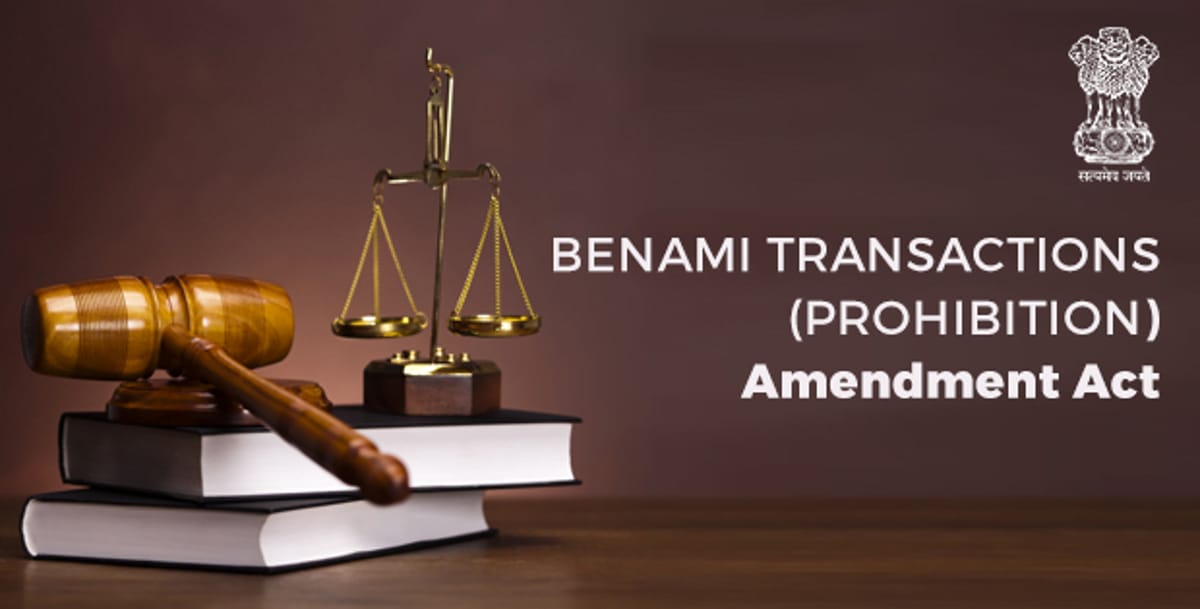niteshbind | Dec 12, 2018 |

Benami Transactions Act, 2016 – Complete Overview:
Recently, Govt. has introduced a law which has given a sudden jolt to the real estate sector. But the fact is, it is not only the real estate sector which would be affected by this law but it would have an impact on all types of properties be it movable or immovable. This law is called the Benami Transaction Act. Although, It is not a new act and it was originally created way back in 1988 but it was only the recent amendment brought in 2016 which has made a complete overhaul of this act and has made it really strong. But, of course, you might be thinking right now; what is it How does it affectme why should I concerned about it Well, you’ll get to know all these things by the end of this article. So, Let’s analyze it in a very simple language and step by step:-
Benami literally means something “without a name”. Therefore, you could easily assume it that any property without a legal name and the valid owner is called Benami. It is a Property which is purchases/sold under a Benami Transaction and it also includes the money involved in such property.
Propertyhere means; assets of any kind, whether movable or immovable, tangible or intangible and it will include any right,interest, title to any property.
Benami Transaction means; a transaction or an arrangement where:
(A)A property is transferred to a person but the Consideration for such property has been given by another person.&Such property is held for the ultimate benefit of the person who has provided the consideration.
(B)A Property has been taken in a fictitious name. [i.e. Purchased in Fake name]
(C)A Property which has been taken in such manner that the owner (as per documents) of the property is not aware of such ownership. [i.e. Purchased in some unknown person name]
(D)The Person giving the consideration for purchase is not traceable or is Fictitious. [i.e. Purchase money is coming from unknown sources]
EXCEPTIONS:There are also some specific Exceptions to the general rule which means if Property has been taken in such manner then it will not be considered as Benami. These Exceptions would be in cases WHEN THE PROPERTY IS HELD BY:
It is generally used to enter into by the people who have unaccounted money; more commonly known as Black money. People make the Benami Transactions to hide their name and use the black money in various types of properties in such names which is either fake or which are not under the lenses of tax departments.
Also, Another reason for entering the Benami Transactions is to hide the true ownership of the property from their lenders, creditors, and banks etc.
In any Benami Transaction the following parties are involved:
(i) Benamidar:It is the person/fictitious person in whose name the property has been purchased.
(ii) Beneficial Owner:It is the person who has provided the consideration for purchase.
(iii) Seller:It is the person who is selling the property.
The people who have entered in any way transactions which are covered under Benami especially the one who has the Black Money and invested the same into Benami Transactions would be hugely affected by this act. They have to bear the Huge penalties and prosecutions under the Act. Also, the real estate sector would be certainly impacted with this and every party involved must be very clear about the true ownership of the property.
People who have taken properties from their genuine sources and for their own direct benefit would not be affected by this law.
The Act prescribes the different penalties and prosecutions for different defaults which are as follows:
Where any person enters into a Benami Transactionthe beneficial owner,benamidarandany other person who supportsany person to enter into the benami transaction shall be guilty under the act and punishable with rigorousimprisonment for a termbetween 1 year to 7 years (+)shall also be liable to fine which may be extend up to25% of the Market Value of the Property.
Any person who is required to furnish information under this Act knowingly gives false information to any authority or furnishes any false document in any proceeding under this Act, shall be punishable with rigorous imprisonment for a termbetween 6 months to 5 years (+)shall also be liable to fine which may extend up to10% of the Market value of the Property.
[Note: An offence under this Act shall be non-cognizable which means it will need a warrant before arresting any such person.]
Where a company is contravening any provision of this Act, then the Company itself AND Every Person (including Director, manager, secretary, CEO etc.) who was responsible for such Transaction shall be deemed to be guilty of the contravention; and shall be liable to be proceeded against and punished accordingly.But if such person proves that such transaction was made without his/her knowledge then such a person would not be considered as guilty.
Important Note:Here;
Companyshall mean:Company, Firm, & AOP/BOI
Directorshall mean:Director, Partner, Any Memberin case of Company, Firm & AOP/BOI respectively.
In case of any further query, suggestions, or ideas, please do comment below. You can follow my blog @ Taxeffects.blogspot.com also reach me at [email protected].
Thanks. Be Helpful to One Another!
In case of any Doubt regarding Membership you can mail us at [email protected]
Join Studycafe's WhatsApp Group or Telegram Channel for Latest Updates on Government Job, Sarkari Naukri, Private Jobs, Income Tax, GST, Companies Act, Judgements and CA, CS, ICWA, and MUCH MORE!"